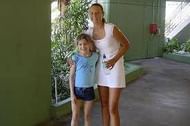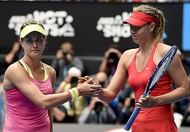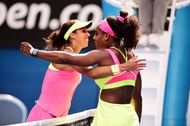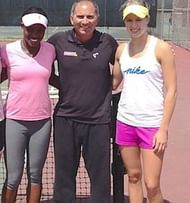In Sports, a sensational victory and a gut wrenching loss can make an athlete the talk of the town. The talk can be effusive praise or scathing criticism. And for a high performing athlete, who is the cynosure of all sporting eyes, these come in cycles depending on how good their winning or losing streak has been.
The Rise of Genie – a new phenom on the horizon
Eugenie Bouchard took the tennis world by storm at the beginning of 2014. As the ancient Chinese proverb goes ‘May you live in interesting times’, Bouchard created ripples at the start of an interesting season.
Roger Federer had had a forgettable 2013 and surprisingly lost to Lleyton Hewitt in the Brisbane Open Final. Ana Ivanovic dumped Serena Williams in the Australian Open Quarter Final and brought about a state of anarchy in the Women’s draw. While the media was news hungry and grappling with a drought of sensationalism, Bouchard came to their rescue with the much awaited fodder.
Armed with a pretty face and a disarming smile, Bouchard possessed an arsenal loaded with big weapons. She was only 20, but her on-court maturity was that of a player who had spent 20 years on the circuit. Calm and composed, she wielded controlled aggression that propelled her to her first ever Grand Slam Semi Final appearance at the Australian Open. She was only the second Canadian to do so.
Fondly called Genie, Bouchard soon became the darling of the media. She also had a group of supporters who called themselves the Genie Army. So true was their love for Bouchard that they did not give up on her even when she professed her desire to date Justin Bieber.
Her marketable face and an even more marketable demeanor, overnight, put her in the same league as Maria Sharapova. A picture of an 8-year-old Bouchard with a young Maria Sharapova went viral.
When asked about her comparison to Sharapova, Bouchard said,”I see it two ways. I see it as a compliment to be compared to someone like Sharapova who has won five Slams. She is a great Champion and I see it in a positive light. But also I’m my own person. I don’t want to be the next someone else. I want to be the first me. That’s what I do. I want to make my own history.”
Remarkable 2014 season
This answer made the whole world go gaga over her maturity. She was appreciated for her commitment to the game and focus on court. After her Aussie Open success, Bouchard went from strength to strength emulating a dream run in Slam after Slam.
In the French Open 2014, she brushed aside some very formidable players only to be outplayed in the Semi Final by the eventual winner Maria Sharapova. Bouchard bettered her Grand Slam outing by going one step further in Wimbledon. Having tasted success as a Junior Champion at Wimbledon in 2012, Bouchard faced the big hitting Petra Kvitova in the Wimbledon Final of 2014. She was ousted in straight sets, but Bouchard proved that she was here to stay.
Though her performance in the US Open was not as great as the other Slams, Bouchard had accumulated enough points during the season to put her in the company of 7 other elite players to compete for the year ending Championships at Singapore. Bouchard earned herself the WTA Most Improved Player of the Year award, but alas! it was probably the last positive highlight of her tennis season.
The free fall and the ‘Handshake’ gate
Bouchard ended her coaching partnership with Nick Saviano in November 2014. This did not augur well for her. After being handed a loss, by her tormentor-in-chief Sharapova, in the Quarter Final stage of the Australian Open this year, her career graph started going downhill. A string of early exits awaited her in various WTA tournaments. Bouchard consistently lost to players who were ranked much below her.
The free flowing tennis, the phenomenal shot making and the killer instinct all of which had punctuated Bouchard’s remarkable run just a year ago seemed to desert her all of a sudden. She was at loss of words to describe her drubbing in one tournament after another. To top it all she created unnecessary ruckus, not once but twice, by refusing the customary pre-match handshake with her opponents in the Fed Cup ties.
According to her, the handshake was “lame”. The first time this happened in 2014, it did not draw as much attention as her tennis took center stage. A year later when she repeated the same, her misplaced attitude made headlines.
She had asked for trouble. Her post match handshakes, especially after a loss, were scrutinized.
Madison Keys, a rising star under the gaze of former World No.1 Lindsay Davenport, was praised for being level headed. Just like her Coach she bludgeons the ball with authority and is also one of the nicest girls on tour. Her no nonsense attitude and respect for star players was conspicuous which did more damage, albeit indirectly, to Bouchard’s image.
Nick Saviano - On the joy of tennis
The career of Sloane Stephens, another upcoming player, had followed a similar script as Bouchard’s a year before. Stephens had an amazing season in 2013, a performance that saw her reach a career high ranking of No.11. However, she could not keep up the same level the next year. Inconsistency and a barrage of inexplicable losses caused her ranking to plummet to an abysmal low of No.45.
Nick Saviano, Bouchard’s former Coach, runs a tennis academy called Saviano High Performance Tennis. Towards the end of 2014 as soon as Bouchard parted ways with Saviano, Stephens wasted no time in forging a coaching alliance with him. Saviano definitely knows the secret of high performance tennis. In about four months into the coaching alliance, Stephens started to produce results.
In Roland Garros this year, post her First Round victory over the 15th seed Venus Williams, Stephens said,” You’ve got to love to compete, and for me I love to run every ball down and want to be there and be like, this is everything right now. I think for me in this moment I feel really good about my tennis and I’m just happy to be here.”
Saviano was delighted with his charge’s positive outlook and intensity. Saviano said that he had wanted Stephens to play each point with passion, joy and total effort. We now know who had inspired those wise bytes from Stephens. Though Stephens lost to Serena Williams in a tightly contested Fourth Round of Roland Garros 2012, it was Stephen’s best outing in a Grand Slam in more than a year. Stephens also reached the Semi Final at Eastbourne in the run up to Wimbledon 2015.
Bouchard’s loss was Sloane’s gain.
The Paradox of Success and rediscovering joy
Author John O’Neil in his cult book The Paradox of Success talks about top business leaders being super successful at work and losing in life. Their family and spiritual lives often bear the brunt of their long working hours. Some of them become self-aware, decipher their inner stories and start leading happy lives. The rest hold on to their power and authority and silently suffer their shadows rather than confronting them.
This applies to the world of Sport too. Many successful athletes often face issues with motivation. Andre Agassi, in his autobiography Open, often mentions about his hatred for tennis. Yet he went on to become the World No.1 and emerged victorious in multiple Grand Slams. Recently, teen sensation Nick Kyrgios made a statement that raised eye brows. He said that he does not love tennis as much as he loves basketball. Yet he is out there in Wimbledon and playing well.
Sara Errani, a couple of years back, was on a losing streak. She confessed in a press meet that she did not enjoy being on court anymore which was a scary sign. A few weeks away from the Sport helped her sort her priorities and get back to being her best. Two- time Wimbledon Champion, Petra Kvitova also faced a similar situation a few months back.
Ana Ivanovic, after early exits from warm up tournaments on clay, said that she felt quite lost on the court.
“I was doing a lot of work with my sparring partner throughout Madrid and Rome, and then this week Mats from Adidas program has been helping me,” Ivanovic said.
“It was good because we worked in the past together; to have someone on the side sort of putting some patterns back in my game, because I felt I was a little bit lost. I played without a purpose, and I can't do that. I have talent and possibility to do many things, but need to have purpose and goal when I step on the court, and I was lacking that. So now I feel I got it back. Obviously it's about getting enough time to practice it and to grow it.”
The Adidas Improvement Program with Mats Merkel helped Ivanovic rediscover her winning ways which saw her reach the Semi Final of Roland Garros this year.
In her 17th defeat of the season, Bouchard lost in the First Round of Wimbledon 2015 to an unseeded Chinese player. Though she blamed it on a grade two tear in her ab, her problems are more profound.
How can Genie improve?
At this point in time for Genie to get out of that bottle and initiate another purple patch, she needs to do two things.
First, she needs to step back and rediscover her joy of playing tennis. Either Bouchard has to reflect on some of her learning from the Saviano school of thought or her current Coach, Sam Sumyk, must help bring back her passion to the game.
Second, she must learn to be a good loser. In an extremely insightful article in The Mint, Deepti Patwardhan talks about how great players like Federer, Nadal and the likes bounce back from a loss time after time. After losing the Final of Wimbledon 2014, Federer said that he needed just about 25 minutes to get over that loss.
All top players, once upon a time, suffered a string of losses before they finally cracked the winning formula and tweaked it as required to extend the duration or frequency of their golden runs.
Defeat is an integral part of a tennis player’s life.
In this year’s Australian Open Final, Maria Sharapova lost to her arch nemesis Serena Williams. This was her 19th loss to Williams.
In the ceremony Sharapova said,” It is an honor playing against Serena and I have not beaten her in a long time. But I love every time I step on court to play against her. She’s been the best and as a tennis player you want to play the best. So Congratulations! for creating history and on an incredible achievement. I love playing on the Rod Laver Arena where I have had some great memories and also had some of my toughest losses. But, that’s the life of a tennis player!”
If Genie can latch on to some of that wisdom she will do herself and her career a great deal of good.
Is Serena Williams a Jehovah's Witness? Why American legend doesn't celebrate birthdays or Christmas



